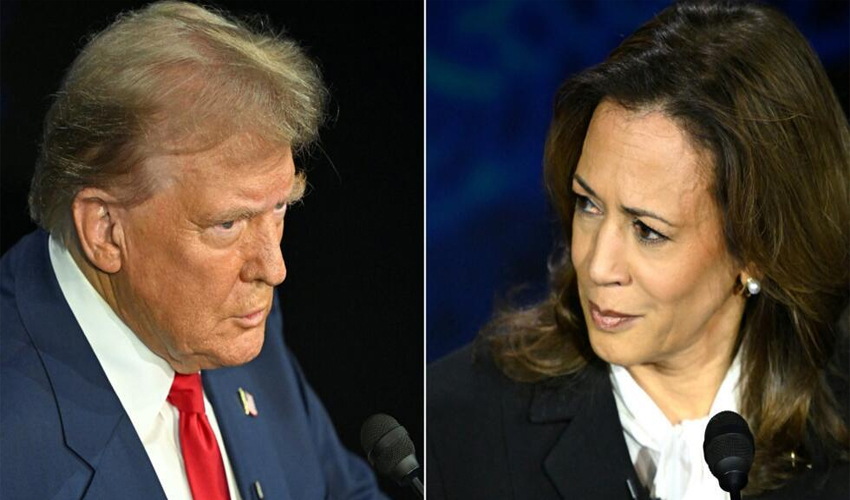With less than a month remaining until the US presidential election, Kamala Harris is facing an increasingly challenging battle against Donald Trump as new polls suggest her lead is rapidly narrowing.
What was once a comfortable advantage for the Democratic candidate has shrunk to a dead heat in the final stretch of the campaign, leaving both candidates neck-and-neck as they gear up for the decisive vote on November 5th.
A series of recent polls, released on Sunday, reveal that Harris’s lead over the former president has either disappeared or significantly dwindled. In NBC News' latest national poll, Harris and Trump are tied at 48 per cent, a notable shift from last month’s survey, where Harris held a five-point advantage.
This trend is echoed in other major polls, such as ABC News/Ipsos, where Harris now leads by just two points, and CBS News/YouGov, which shows a slim three-point lead in her favour.
According to Real Clear Politics aggregate of major polls, Harris now holds a 1.4 per cent lead, down from 2.2 per cent on Saturday. The shrinking numbers are a stark reminder of the volatile nature of the race as both campaigns intensify their efforts in key battleground states, aiming to sway undecided voters.
Democratic concerns
Harris’s diminishing lead has sparked concerns within the Democratic Party, particularly over her inability to maintain strong support among African American and Hispanic voters—demographics that have traditionally been key to the party’s success. Although she continues to lead among women across all racial groups, Harris has faced difficulties in energizing male voters, especially Black and Hispanic men, who are increasingly leaning toward Trump.
In a New York Times/Siena College poll released over the weekend, Harris garnered the backing of 78 percent of Black voters and 56 percent of Hispanic voters. While these numbers reflect a majority, they are noticeably lower than the support Democratic nominees received in both the 2016 and 2020 elections.
The issue of waning support among Black men, in particular, has drawn public commentary from former President Barack Obama. During a campaign event in Pittsburgh, Pennsylvania, a key battleground state, Obama voiced his frustration with the apparent lack of enthusiasm among Black male voters for Harris’s candidacy.
“You’re coming up with all kinds of reasons and excuses, I’ve got a problem with that,” Obama remarked. “Because part of it makes me think – and I’m speaking to men directly – part of it makes me think that, well, you just aren’t feeling the idea of having a woman as president, and you’re coming up with other alternatives and other reasons for that.”
Obama’s remarks highlight a broader concern within the Democratic camp: that Harris’s historic candidacy as the first woman and person of color to be nominated for the presidency may not be enough to galvanize crucial voter segments.
Campaigns intensify focus on key states
In response to the tightening race, both candidates have sharpened their focus on pivotal battleground states that are expected to determine the outcome of the election. Over the weekend, Harris and Trump held rallies in North Carolina and Arizona, respectively, aiming to shore up support in states that could swing the election in either direction.
Addressing a crowd in Greenville, North Carolina, Harris criticized Trump for spreading misinformation about the government’s handling of recent natural disasters, particularly hurricanes, accusing him of undermining public trust in critical life-saving services. “The problem with this, beyond the obvious, is it’s making it harder to get people life-saving information if they’re led to believe they cannot trust,” Harris said. “That’s the pain of it all.”
Meanwhile, Trump used his rally in Prescott Valley, Arizona, to double down on his hardline stance on immigration, pledging to bolster the U.S. Border Patrol if re-elected. He promised to push Congress for a 10 percent pay raise for agents and a $10,000 retention and signing bonus, stating, “We’re going to retain them.”
Election landscape uncertain
As both campaigns continue their push in the final weeks, the overall outlook for the election remains uncertain. Harris’s struggle to consolidate support among key Democratic voter groups, combined with Trump’s continued appeal to male voters and his hardline immigration policies, has shifted the dynamics of the race.
While Harris has the advantage of leading among women and maintaining a slight edge in national polling, the critical question remains whether she can rekindle the enthusiasm that propelled Barack Obama and Joe Biden to victory among key constituencies. Conversely, Trump’s persistent appeal to working-class voters, particularly men of all racial groups, suggests that the former president could once again defy pollsters and reclaim the White House.
As the November 5 election approaches, the race remains a contest of persuasion, with both candidates locked in an intense battle for the undecided voters who could tip the scales.



























